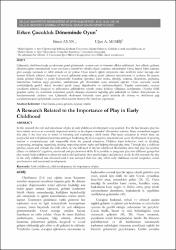| dc.contributor.author | Ayan, Sinan | |
| dc.contributor.author | Memiş, A. Uğur | |
| dc.date.accessioned | 2020-06-25T14:40:49Z | |
| dc.date.available | 2020-06-25T14:40:49Z | |
| dc.date.issued | 2012 | |
| dc.identifier.citation | Ayan, S., Memiş, A. U. (2012). Erken çocukluk döneminde oyun. Selçuk Üniversitesi Beden Eğitimi ve Spor Bilim Dergisi, 14(2), 143 - 149. | en_US |
| dc.identifier.issn | 1300-9915 | |
| dc.identifier.uri | https://app.trdizin.gov.tr/publication/paper/detail/TVRRNE9USTVPUT09 | |
| dc.identifier.uri | https://hdl.handle.net/20.500.12587/583 | |
| dc.description.abstract | Çalışmada, okulöncesi çağı çocuklarının genel gelişiminde oyunun yeri ve önemine dikkat çekilmiştir. Son yıllarda gelişmiş ülkelerin eğitim sistemlerinde oyun son derece önemli bir etkinlik olarak karşımıza çıkmaktadır. Oyun, birçok bilim adamına göre çocuğu tanımada ve tahlil etmede en iyi yoldur. Oyun temelli eğitim yetişmekte olan nesillerin temel kaynağı olan insanın fiziksel, zihinsel, duygusal ve sosyal gelişimini amaç edinen, genel eğitimin tamamlayıcısı ve ayrılmaz bir parçası olarak görülen bilinçli ve planlı faaliyetlerdir. Çocuklar öğrenme, karar verme, işbirliği, sıralama, düzenleme, paylaşma, başkalarının hakkına saygı gösterme, yardımlaşma gibi davranışları oyun sırasında öğrenir. Oyun sayesinde çocuk yetişkinliğinde gerekli olacak becerileri pratik yapar, değerlendirir ve mükemmelleştirir. Yapılan araştırmalar, oyunun çocukların zihinsel, duygusal ve psikomotor gelişimlerine olumlu yönde katkıları olduğunu kanıtlamıştır. Oyunlar farklı gruplara ayrılsa da, temelinde çocukların gerçek dünyaya alışmasını sağladığı gibi psikolojik ve fiziksel ihtiyaçlarının da karşılanmasında yardımcı olur. Çalışmada okulöncesi dönemde oyun genel anlam | en_US |
| dc.description.abstract | In this research the role and importance of play in early childhood development were pointed. For the last decades, play has been widely seen as an extremely important activity in developed countries‘ educational systems. Many researchers suggest that play is the best way in terms of knowing and examining a child better. Play-based education in which there are purposeful and well-planned activities aiming at facilitating physical, cognitive, emotional and social development of growing nations is complementary and inseparable from the general education. Children learn behaviors such as deciding, cooperating, arranging, organizing, sharing, respecting others‘ rights and helping through play time. Through play a child can practice, assess and evaluate the skills which he/she will need in his/her adulthood. Researches show that play has positive effects on children‘s‘ cognitive, emotional and psychomotor skills. It is possible to categorize play into different groups but play mainly helps children to adopt the real world and satisfy their psychological and physical needs. In this research the play in the early childhood was discussed and it was surveyed that how play affect early childhood overall (cognitive, social, psychomotor and emotional) development. | en_US |
| dc.language.iso | tur | en_US |
| dc.rights | info:eu-repo/semantics/openAccess | en_US |
| dc.subject | Spor Bilimleri | en_US |
| dc.subject | Eğitim, Eğitim Araştırmaları | en_US |
| dc.title | Erken çocukluk döneminde oyun | en_US |
| dc.title.alternative | A research related to the importance of play in early childhood | en_US |
| dc.type | other | en_US |
| dc.contributor.department | Kırıkkale Üniversitesi | en_US |
| dc.identifier.volume | 14 | en_US |
| dc.identifier.issue | 2 | en_US |
| dc.identifier.startpage | 143 | en_US |
| dc.identifier.endpage | 149 | en_US |
| dc.relation.journal | Selçuk Üniversitesi Beden Eğitimi ve Spor Bilim Dergisi | en_US |
| dc.relation.publicationcategory | Diğer | en_US |
















